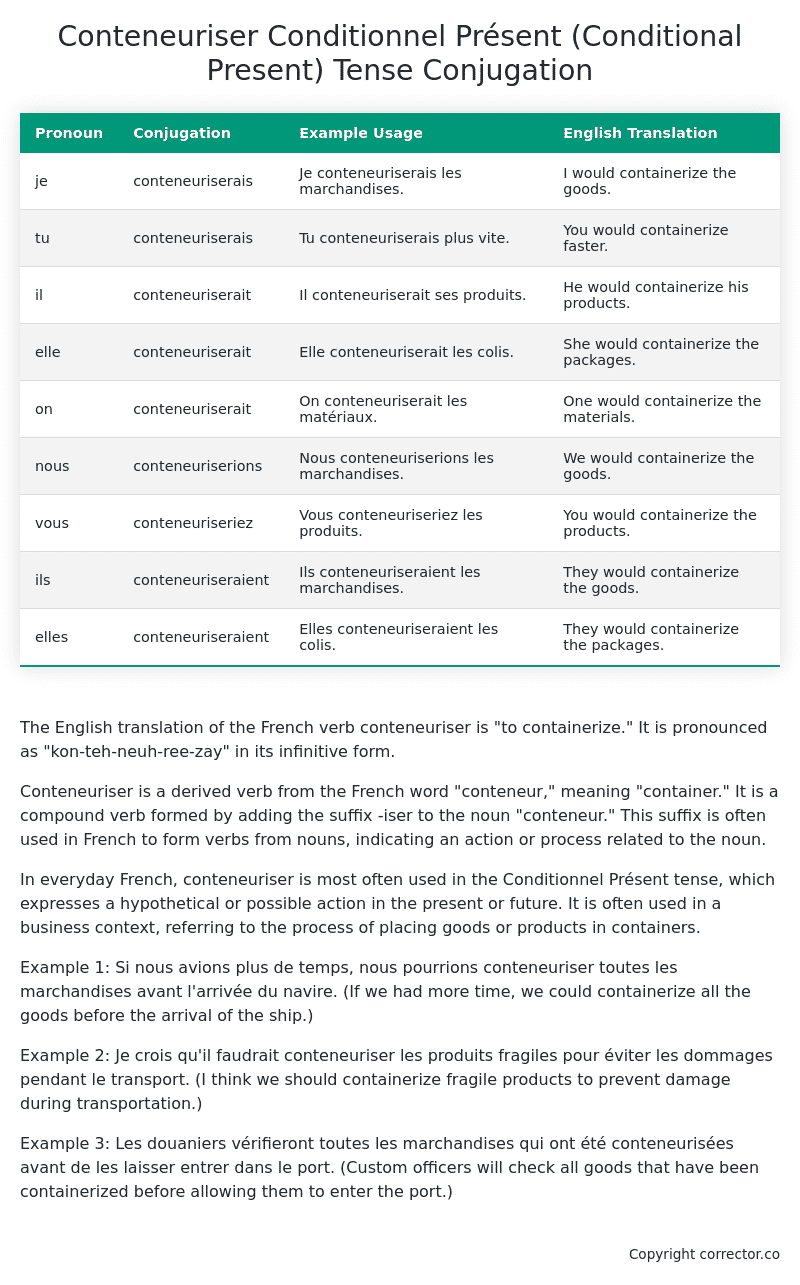Conditionnel Présent (Conditional Present) Tense Conjugation of the French Verb conteneuriser
Introduction to the verb conteneuriser
The English translation of the French verb conteneuriser is “to containerize.” It is pronounced as “kon-teh-neuh-ree-zay” in its infinitive form.
Conteneuriser is a derived verb from the French word “conteneur,” meaning “container.” It is a compound verb formed by adding the suffix -iser to the noun “conteneur.” This suffix is often used in French to form verbs from nouns, indicating an action or process related to the noun.
In everyday French, conteneuriser is most often used in the Conditionnel Présent tense, which expresses a hypothetical or possible action in the present or future. It is often used in a business context, referring to the process of placing goods or products in containers.
Example 1: Si nous avions plus de temps, nous pourrions conteneuriser toutes les marchandises avant l’arrivée du navire. (If we had more time, we could containerize all the goods before the arrival of the ship.)
Example 2: Je crois qu’il faudrait conteneuriser les produits fragiles pour éviter les dommages pendant le transport. (I think we should containerize fragile products to prevent damage during transportation.)
Example 3: Les douaniers vérifieront toutes les marchandises qui ont été conteneurisées avant de les laisser entrer dans le port. (Custom officers will check all goods that have been containerized before allowing them to enter the port.)
Table of the Conditionnel Présent (Conditional Present) Tense Conjugation of conteneuriser
| Pronoun | Conjugation | Example Usage | English Translation |
|---|---|---|---|
| je | conteneuriserais | Je conteneuriserais les marchandises. | I would containerize the goods. |
| tu | conteneuriserais | Tu conteneuriserais plus vite. | You would containerize faster. |
| il | conteneuriserait | Il conteneuriserait ses produits. | He would containerize his products. |
| elle | conteneuriserait | Elle conteneuriserait les colis. | She would containerize the packages. |
| on | conteneuriserait | On conteneuriserait les matériaux. | One would containerize the materials. |
| nous | conteneuriserions | Nous conteneuriserions les marchandises. | We would containerize the goods. |
| vous | conteneuriseriez | Vous conteneuriseriez les produits. | You would containerize the products. |
| ils | conteneuriseraient | Ils conteneuriseraient les marchandises. | They would containerize the goods. |
| elles | conteneuriseraient | Elles conteneuriseraient les colis. | They would containerize the packages. |
Other Conjugations for Conteneuriser.
Le Present (Present Tense) Conjugation of the French Verb conteneuriser
Imparfait (Imperfect) Tense Conjugation of the French Verb conteneuriser
Passé Simple (Simple Past) Tense Conjugation of the French Verb conteneuriser
Passé Composé (Present Perfect) Tense Conjugation of the French Verb conteneuriser
Futur Simple (Simple Future) Tense Conjugation of the French Verb conteneuriser
Futur Proche (Near Future) Tense Conjugation of the French Verb conteneuriser
Plus-que-parfait (Pluperfect) Tense Conjugation of the French Verb conteneuriser
Passé Antérieur (Past Anterior) Tense Conjugation of the French Verb conteneuriser
Futur Antérieur (Future Anterior) Tense Conjugation of the French Verb conteneuriser
Subjonctif Présent (Subjunctive Present) Tense Conjugation of the French Verb conteneuriser
Subjonctif Passé (Subjunctive Past) Tense Conjugation of the French Verb conteneuriser
Subjonctif Imparfait (Subjunctive Imperfect) Tense Conjugation of the French Verb conteneuriser
Conditionnel Présent (Conditional Present) Tense Conjugation of the French Verb conteneuriser (this article)
Conditionnel Passé (Conditional Past) Tense Conjugation of the French Verb conteneuriser
L’impératif Présent (Imperative Present) Tense Conjugation of the French Verb conteneuriser
L’infinitif Présent (Infinitive Present) Tense Conjugation of the French Verb conteneuriser
Struggling with French verbs or the language in general? Why not use our free French Grammar Checker – no registration required!
Get a FREE Download Study Sheet of this Conjugation 🔥
Simply right click the image below, click “save image” and get your free reference for the conteneuriser Conditionnel Présent tense conjugation!

Conteneuriser – About the French Conditionnel Présent (Conditional Present) Tense
Formation
Common Everyday Usage Patterns
Expressing Polite Requests
Expressing Hypothetical Situations
Expressing Doubt or Uncertainty
Interactions with Other Tenses
Present Tense
Past Tense
Future Tense
Conditional Perfect
Summary
Want More?
I hope you enjoyed this article on the verb conteneuriser. Still in a learning mood? Check out another TOTALLY random French verb conjugation!


